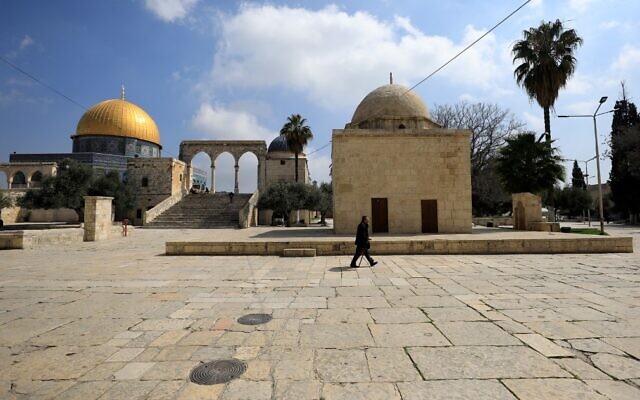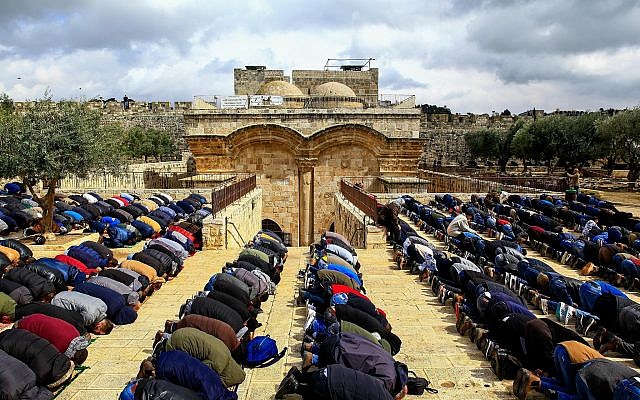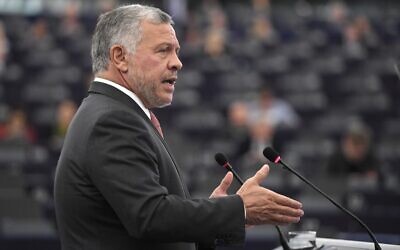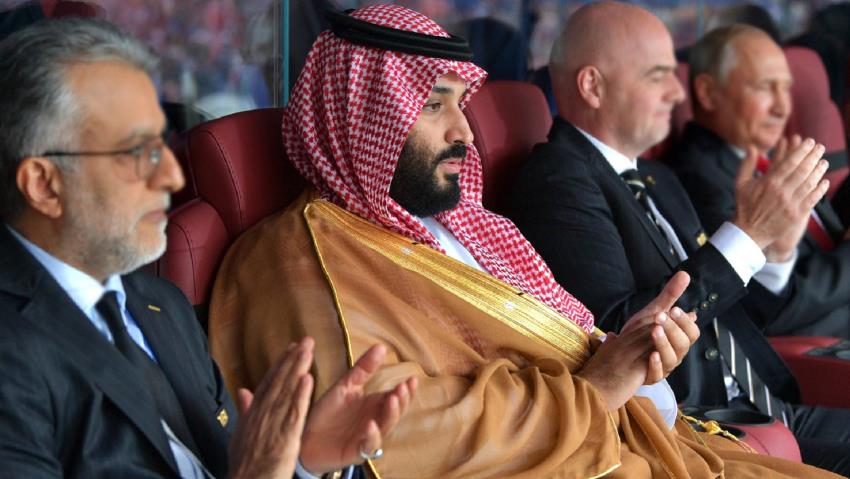Saudi Arabia in ‘secret’ talks with Israel over control of Al-Aqsa
Middle East Monitor, June 1, 2020
Muslims arrive to perform the Friday Prayer at Al-Aqsa Mosque Compound in Jerusalem on January 31, 2020
[Mostafa Alkharouf - Anadolu Agency]
Israel and Saudi Arabia have reportedly engaged in secret meetings since last December, regarding including Saudi representatives in the Islamic Waqf Council at the Al-Aqsa Compound in Jerusalem.The Islamic Waqf Council is a Jordanian-appointed body, which oversees Muslim sites in Jerusalem and claims exclusive authority over the Al-Aqsa Compound and says it is not subject to Israeli jurisdiction.
The talks have reportedly taken place within the context of US President Donald Trump’s controversial Israel-Palestine plan, known colloquially as the “deal of the century”, the diplomats said.
“These are sensitive and secret discussions conducted with ambiguity and low intensity with a small team of diplomats and senior security officials from Israel, the US and Saudi Arabia as part of negotiations to progress the Deal of the Century,” said senior Saudi diplomats to Israel Hayom.
The Israeli paper further reports that the Jordanians reached out to Israel and the US and said it had softened their position regarding Saudi representation to counter the increased Turkish influence.
It is however on the conditions that Jordan would retain its exclusive status as the custodian of the holy sites, and that Saudi Arabia fund Islamic organisations in East Jerusalem while expelling those funded by Turkey.
A senior Arab diplomat told Israel Hayom: “If the Jordanians had allowed the Turks to operate without interruption in Al-Aqsa, within a few years they would have remained ‘only on paper’ as having a special status in managing the holy places of Islam. They need money and influence from Saudi Arabia to curb [Turkish President] Erdogan.”
“Israel and the U.S. also have an interest here in their desire to support Saudi Arabia in advancing the deal of the century plan and during the process of annexation. Saudi Arabia also brings with it the support of the UAE and Bahrain,” he said.
Saudi Arabia would be given the status of observer so as not to harm the unique status of Jordan as guardian of the holy sites, the report added.
Palestinian-Saudi relations have publicly been on edge for almost two years, mainly over the kingdom’s close ties with US President Donald Trump’s administration and Riyadh’s apparent support for the ‘deal of the century’ and normalisation of ties with Israel.
Israel, Saudis hold talks for Riyadh to join Temple Mount Waqf – report
Move comes amid reported concern in Amman over Turkish influence at the site and elsewhere in East Jerusalem
By TOI STAFFThe Times Of Israel, 1 June 2020
A man walks past the Dome of the Rock, in the Temple Mount compound, in the Old City of Jerusalem
on March 16, 2020.
(Emmanuel DUNAND/AFP)
Israeli and Saudi officials have been conducting secret talks since December, mediated by the United States, with the aim of integrating representatives from Riyadh onto the Islamic Waqf Council that controls the Temple Mount, the Israel Hayom daily reported Monday.The move was said to come as Jordan is reportedly increasingly worried by the levels of Turkish influence in Palestinian affairs and matters concerning East Jerusalem.
Unnamed senior Saudi officials told Israel Hayom that “these are sensitive and covert contacts that were conducted in ambiguity and low intensity by a limited team of senior diplomats and security officials from Israel, the US and Saudi Arabia as part of the contacts to advance the [White House’s Middle East peace] plan.”
The Waqf, a Jordanian-appointed council, oversees Muslim holy sites in Jerusalem. It claims exclusive authority over the Temple Mount compound and says it is not subject to Israeli jurisdiction. Tensions often escalate at the site.
According to the report, Jordan’s King Abdullah II has changed his mind about altering the makeup of the Waqf after a series of protests last year and the reopening of the Gate of Mercy, a section just off the Al Aqsa Mosque plaza.
Palestinians take part in Friday prayers near the Golden Gate, or Gate of Mercy, in the Temple Mount
compound in Jerusalem’s Old City, on March 1, 2019.
(Sliman Khader/Flash90)
In February 2019, Jordan decided to bolster the central committee of the Waqf from 11 members to 18, and all seven additions were senior Fatah and PA members.Israel Hayom said that the new delegates allowed Turkish Islamic organizations to establish organizations at the complex that were funded to the tune of tens of millions of dollars by Ankara, under the direct orders of Turkish President Recep Tayyip Erdogan.
According to the report, the new deal being negotiated would see Jordan retain custodianship of the Temple Mount, but Saudi Arabia would pump millions of dollars into Islamic organizations in East Jerusalem and at the site, and would apply diplomatic pressure for the Turkish organizations to withdraw.
A senior Arab diplomat, whose name and country of origin were not divulged in the report, told the newspaper that it was in the interests of Israel and the US to support Saudi Arabia so that the kingdom in turn gave its backing to US President Donald Trump’s Middle East plan, bringing with it the support of the United Arab Emirates and Bahrain.
Jordanian King Abdullah II delivers a speech at the European
Parliament on January 15, 2020, in Strasbourg, eastern France.
(Frederick Florin/AFP)
This change of heart by Jordan reportedly comes despite Abdullah saying at the start of last year that although he was under pressure to alter his country’s historic role as custodian of the Jerusalem holy sites, he wouldn’t change his position.Middle East pundits have in the past suggested that Saudi Arabia was interested in taking over responsibility for the Temple Mount and the mosques within its compound.
Saudi Arabia is already the custodian of the two holiest sites in Mecca and Medina, both within its territory.
Agencies contributed to this report.
Israel, Saudi Arabia hold 'secret talks' on curbing Turkish presence in Jerusalem
The New Arab, 1 June, 2020
Saudi Arabia has been accused of increasing normalisation with Israel [AFP]
Saudi Arabia, Israel and Jordan are working together in a bid to repel Turkey's growing influence in Jerusalem, an Israeli newspaper revealed.
Secret communications have been ongoing between Israel and Saudi Arabia focused on giving the kingdom a pivotal role in the management of Islamic endowments in occupied Jerusalem, an Israeli newspaper revealed, though authorities quickly refuted the allegations.The Riyadh-Tel Aviv meetings included "sensitive calls that were carried out in secret through diplomats and high level security parties from Israel, the United States and Saudi Arabia, as part of efforts to advance the deal of the century deal," the Israel Hayom newspaper reported, citing high-level Saudi diplomats.
The report also revealed Jordan's initial vehement opposition to any changes in the Islamic Endowments Council in Al-Aqsa Mosque, which has now changed due to the ongoing "intensive" Turkish role in the holy site.
According to the newspaper, the Jordanian party stopped objecting to the expansion of the Islamic Endowments Council and agreed, in an exceptional step and contrary to the Oslo agreements, to include Palestinian representatives in the council following the events of the Bab al-Rahma unrest last year and the metal detector crisis in 2017.
The report also accused Palestinian delegates, through their membership in the council, of paving the way for "Iranian and Turkish elements" to establish a foothold in the Al-Aqsa Mosque, through various associations that received tens of millions of dollars in funding from the Turkish government based on alleged "clear orders from Turkish President Recep Tayyip Erdogan".
As a result, the Jordanian side conveyed to Israel and the United States messages that the royal family in Jordan would be willing to reduce its opposition to everything related to the inclusion of Saudi representatives in the council, without affecting the special position of the Hashemite kingdom.
In return, the Jordanian side stipulated that the Saudis pump funds to Islamic societies active in occupied Jerusalem and the Al-Aqsa Mosque, and exert political pressure to remove Turkish Muslim associations operating in the city under Palestinian cover."If the Jordanians allowed the Turks to work freely in the Al-Aqsa Mosque, they would have remained after a few years as owners of a special position in the management of the holy sites," the newspaper quoted a senior Arab diplomat as saying.
Jordan needs the money and Saudi Arabia's influence in Jerusalem to repel Erdogan, which also meets the interests of Israel and the United States because this is in line with their Deal of the Century efforts, the source suggested.
Support from Saudi Arabia would also bring similar sentiment from the UAE and Bahrain, as well as other Arab nations to back President Donald Trump's so-called peace plan as well as Netanyahu's ambitions to annex the West Bank.
The source added that "it is still early to say whether this step went into effect", explaining that "the goal is to include Saudi delegates as non-binding observers only so that the exclusive status of Jordan is not damaged".
The General Director of the Islamic Endowments Endowment and Al-Aqsa Mosque Affairs in Jerusalem Azzam Al-Khatib swiftly moved to deny the "baseless" reports, confirming Jordan's inherited guardianship and historical patronage of the holy sites, according to Arabi21.
Jordanian sources speaking to Arabi21 also denied reports published by Israeli media, noting they were "incorrect".
Egypt-Israeli meetings
The report comes just days after sources close to the Egyptian regime told The New Arab’s Arabic language service that Israel's Mossad chief met with the head of Egypt's General Intelligence Service, Abbas Kamel, during a secret visit to Cairo to discuss annexations of large swaths of the occupied West Bank.Cohen was projecting possible reactions to the annexation of illegal Israeli settlements and was trying to pre-empt potential reactions from Palestinian factions – especially Hamas.
The source reported both the Egyptian and Israeli sides were discussing the possibility of matters "going out of control".
Israel's biggest concern is that Palestinians will react violently, especially through conducting suicide operations – a tactic that was commonly used during the Second Intifada. Jerusalem is especially vulnerable to such retaliations, Tel Aviv fears.
The talks happened in the presence of Egypt's foreign minister Sameh Shoukry, according to the report.
The discussions between the Egyptian and Israeli officials were followed by an Egyptian briefing to Jordanian officials on a number of points that Cohen made, the source cited said.
Israeli Prime Minister Benjamin Netanyahu's plans to annex 80 percent of the West Bank's illegal Israeli settlements.
Some critics say the annexations do not go far enough and Tel Aviv should annex all of the settlements illegally built on Palestinian land.The unity government formed earlier this month by Netanyahu and centrist Benny Gantz has said it can start annexing parts of the West Bank as soon as July 1.
The Israeli government's annexation plans go hand-in-hand with a peace proposal by the Trump administration unveiled earlier this year.
The so-called "Deal of the Century" gives Israel a green light to annex most West Bank settlements, which are considered illegal under international law, as well as the strategic Jordan Valley.
"We have a historic opportunity, which hasn't existed since 1948, to apply sovereignty judiciously as a diplomatic... step in Judea and Samaria," Netanyahu told a meeting of lawmakers from his right-wing Likud party on Tuesday.
Right-wing Israelis and settlement advocates often use the biblical names Judea and Samaria to refer to the occupied West Bank.
|
Races? Only one Human race United We Stand, Divided We Fall |
 |
No time to waste. Act now! Tomorrow it will be too late |
|









































